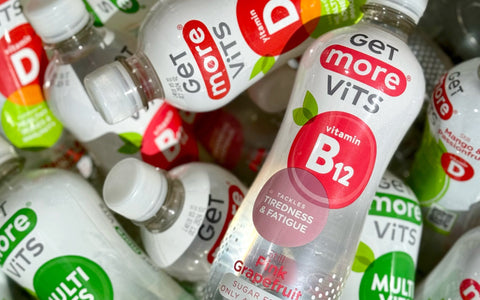
Your body needs the right vitamins and minerals in order to function correctly. One of the most important vitamins is Vitamin B12, which helps to maintain nerve tissue health, produce red blood cells and enhance brain function, among many other benefits.
In essence, it’s a vitamin that your body very much needs, and there can be negative consequences if your body does not have adequate levels of vitamin B12., Some of which may have a serious impact on your overall health, while others can compromise your overall enjoyment of life.
For example, a person that does not have enough vitamin B12 may find that they experience:
- Fatigue
- Difficulty in focusing
- Memory problems
- Low testosterone (males)
- Infertility issues (females).
- Mood swings.
If a vitamin B12 deficiency is left untreated, then there’s an increased risk of developing anaemia, which results in the body producing red blood cells which are abnormally large, and which can not function properly.
The symptoms of anaemia can mimic those associated with general B12 deficiency, so just because you have fatigue or memory issues, doesn’t necessarily mean that you’re anaemic.
In either case, it’ll be important to tackle the issue as soon as possible.
The good news is that addressing a vitamin B12 deficiency is relatively straightforward, thanks to the large number of B12 supplements that are available.
How long to recover from vitamin B12 deficiency depends on various factors, but most people find that they have adequate levels after a few months to a year of B12 treatment.
What Is Vitamin B12
So what is vitamin B12, anyway? It belongs to the B group of vitamins, which totals eight in all. These B vitamins provide a wide range of benefits to your body, including providing you with energy and ensuring that your critical functions can work correctly.
The full list of B vitamins is as follows:
- B1 (otherwise known as Thiamine)
- B2 (Riboflavin)
- B3 (Niacin)
- B5 (Pantothenic Acid)
- B6 (Pyridoxine))
- B7 (Biotin)
- B9 (Folate)
- B12 (Cobalamin)
Your body does not naturally produce B vitamins.
Instead, we get these vitamins, including vitamin B12, through our diet. Our body cannot store vitamins for very long and as such, we need to continually top up our B12 levels.
While the majority of people get enough vitamin B12 via the food and liquids they consume, this isn’t always the case. If you’re not getting enough B12 from your diet, then you’ll be at risk of deficiency and will need to increase your levels.
Wondering how much vitamin B12 you should take each day? The exact amount depends on your age, lifestyle, and other influential factors. However, there is a recommended daily intake, as follows:
Under 50 Years of Age
If you’re over the age of 14, but under the age of 50, then it’s recommended that you have 2.4 mcg of vitamin B12 each day.
It’s likely that you get this through your diet. For example, if you had two eggs for breakfast, a tuna sandwich for lunch, and a beef-based dish for dinner, then you’d easily get enough B12.
Over the Age of 50
People over the age of 50 are more likely to have vitamin B12 deficiency. One study found that up to 20% of people over 60 have deficient B12 levels. This is due to the natural ageing process; as we age, we produce less stomach acid, which helps us to release vitamin B12 from our food, which means that many older adults are unable to get the appropriate levels of B12 via their diets.
For this reason, it’s generally recommended that people over the age of 50 take B12 supplements.
What Can Cause Vitamin B12 Deficiency?
As we’ve already mentioned, it’s essential that all people have adequate levels of B12 in order to ensure their bodies can function exactly as they're supposed to.
However, for a variety of reasons, this isn't always possible. Below, we’ll take a look at some of the key reasons why people may experience vitamin B12 deficiency.
Diet
As mentioned, it’s possible to get all the vitamin B12 you need via your diet.
However, that’ll only happen if you eat foods that contain B12. If you have plenty of fish, meat, and dairy products in your diet, then you’ll almost certainly have correct B12 levels.
If you don’t eat these foods regularly, or only do so in small amounts, then you’ll be at increased risk of B12 deficiency.
People transitioning to a vegan or vegetarian diet are also at increased risk.
Remember that your body can store B12 for around 2 - 4 years, so it can take some time for vitamin B12 deficiency to present itself to people who have only recently transitioned to veganism/vegetarianism.
Pernicious anaemia
This is the most common cause of B12 deficiency.
An autoimmune condition, pernicious anaemia affects the stomach and causes your body’s immune system to attack healthy cells, including the ones that are responsible for the “intrinsic factor,” which absorbs B12 into the body.
Once this system breaks down, your body will no longer be able to adequately receive B12 through the usual food method without additional help.
Gastric surgeries
Gastric surgeries can also influence your body’s ability to absorb vitamin b12.
This is because these surgeries usually impact your body’s acid secretion levels. The lower levels of acid result in lower intrinsic factor levels, which then impact your body’s B12 (and iron) absorption rates.
As with a shift in diet, it can take time for these changes to present themselves. Most people with gastric surgery feel the symptoms of decreased B12 levels around two years after the procedure.
Intestinal problems
A healthy intestine is required to fully absorb vitamin B12. If you have intestinal issues such as Crohn’s Disease or Celiac Disease, then the part of your intestine that is responsible for absorption may shut down.
Overgrowth of bacteria
Your gut needs bacteria to function correctly. In some cases, however, a person can experience an overgrowth of bacteria. At that stage, the bacteria can hijack B12 that your body needs and use it for its own purposes.
Menopause
The menopause process leads to hormonal changes, both during the process and after. This shift in hormones can make it more difficult for women to absorb vitamin B12, in which case supplements are often required.
Signs And Symptoms Of Vitamin B12 Deficiency
- Anaemia (lack of red blood cells)
Symptoms of anaemia include: Fatigue, dizziness, paleness, and a rapid heart rate
- Neuropathy (damage to the nerves)
Symptoms of neuropathy include balance problems, weakness, numbness, and tingling.
- Myelopathy (damage to the spinal cord)
Symptoms of myelopathy include tingling, numbness, and sensory problems.
- Dementia (an impairment of mental capabilities and processes)
Symptoms of dementia include behavioural changes and general cognitive decline.
Diagnosing Vitamin B12 Deficiency
If you’re low in energy, have trouble focusing, and have reason to suspect that you may not be absorbing adequate levels of B12 (for example, you have had gastric surgery), then you may be vitamin B12 deficiency.
In that case, remember that treatment is available to you via a change in diet, supplements, or B12 injections. Below, we’ll run through a step-by-step guide to what your journey towards boosting your B12 levels may look like.
- Talk to your doctor
Your doctor will be able to perform a physical examination and conduct blood tests and other diagnostic tests to determine your B12 levels.
- Seek treatment
Your doctor will recommend treatment. This may take the form of dietary changes, receiving B12 injections, or taking B12 supplements.
- Monitoring your health
Once you’ve begun treatment, monitor your B12 levels over a period of months to ensure your body is absorbing the vitamin correctly.
How Long Does It Take To Recover From Vitamin B12 Deficiency
It is possible to restore your vitamin B12, but it won’t happen overnight. It usually takes a few months for most people to see an improvement, which is often gradual. In extreme cases, it can take up to a year to notice the effects of treatment, but in most cases, you’ll be looking at around 4 - 6 months.
Preventing Vitamin B12 Deficiency
The best way to prevent vitamin B12 deficiency is to have a healthy, balanced diet that contains plenty of animal products. For example,
- Eggs
- Poultry
- Fish
- and red meat.
It’s also possible to buy non-animal-based food products that have been fortified with B12, such as specific plant-based milk and breakfast cereals.
However, this isn’t the ideal solution for everyone. For example, vegetarians and vegans can find it difficult to get the right amount of vitamin B12 in their diet. In that case, it’s recommended to look at additional ways to give your body the amount of B12 it needs to be at its best.
We have created a healthy — and delicious — vitamin B12 drink that will ensure you can easily reach your daily allowance of B12. Find out more here.
Conclusion
It’s easy to overlook vitamin B12, but it is important to ensure that your body is getting the right amount it needs to be at its best. Spending a little bit of time to ensure you’re getting B12 from your diet or via supplements is a surefire way to prevent problems from developing further down the line.
Let’s recap some of the key causes of vitamin B12 deficiency:
- Poor/inadequate diet.
- Recent gastric surgery
- Pernicious anaemia
- Menopause
- Overgrowth of bacteria.
If you fall into any of those categories, then take steps to address the issue now. A vitamin B12 deficiency often presents itself a couple of years after the issue first arises, so by taking action today, you can prevent symptoms from developing later on.

